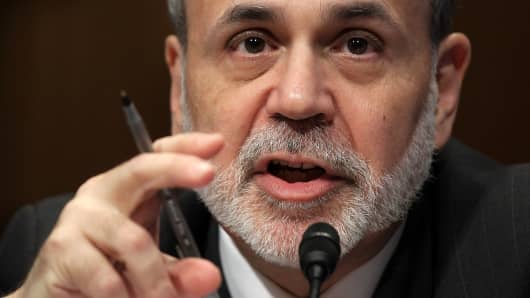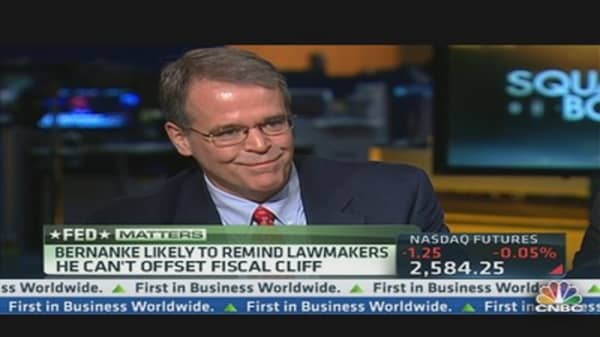The next steps in the Federal Reserve's attempt to guide the economy through recovery could come to light today when Chairman Ben Bernanke delivers a speech likely to garner significant market attention.
While an address two days before a major holiday otherwise might not get much notice, chatter has increased that Bernanke will indicate additional stimulative measures from the central bank.
"His normal logic is to indicate things and flag things well in advance so he can push different members of the (Open Market) Committee into the same direction," said Torsten Slok, chief international economist at Deutsche Bank. "There's a good chance that he will come out and say that he continues to be worried about the outlook today."
How that worry manifests itself is likely to come in the form of additional asset purchases aimed at keeping the economy on a path forward, and steering investors towards riskier assets.
Consensus is that ultimately the Fed will continue to buy about $40 billion worth of mortgage-backed securities per month and halt its Operation Twist program at the end of the year.
The Twist program entails selling shorter-dated securities and buying those on the far end of the curve in an effort to drive down long-term interest rates. However, the Fed is running out of short-dated notes and bills to sell.
In its place is likely to come a renewed effort to buy about $45 billion a month in Treasurys and continue to expand the Fed's $2.9 trillion balance sheet.
The combination of MBS and Treasurys purchases then would continue on an open-ended basis until the Fed reaches economic growth that would foster an acceptable level of unemployment, currently at 7.9 percent. (Read More: Sandy's Impact on Job Growth Will Be 'Acute': LaVorgna)
"Given the headwinds facing the US economy, including problems relating to US fiscal policy, it is hard to imagine a sustained acceleration in growth before the middle of 2013," economists at Nomura Securities said in an analysis. "That means that MBS purchases will likely go on until the third quarter of 2013."
The Fed likely will keep its promise to keep interest rates near zero until 2015.
"If there is any lesson from the financial crisis, it's that financial stability is paramount in meeting broader policy objectives," said Neal Soss, economist at Credit Suisse. "Raising rates too much or too soon could expose a key vulnerability in the financial system. This is yet another argument for expecting interest rates to remain at very low levels for a very long time".
How that plays in the market is hard to tell; previous stimulative measures, known as quantitative easing, have helped spur asset prices, though the third round announced in September has had little effect.
Fed critics worry that all of the money creation will lead to inflation once the central bank clears the debt it has purchased from its balance sheet.
"Mark my words, the concern from about a year out from here is going to be all about monetary policy and how do we reverse this huge animal we created," said Jim Paulsen, chief market strategist at Wells Capital Management. "It won't just be here, it will be in Europe and China and everywhere. It's a huge problem. I wish they'd start thinking ahead a little bit."
Amid its stimulus efforts the Fed has pleaded with Washington political leaders to contain the burgeoning fiscal debt and deficit problems. A crisis awaits at the end of the year — Bernanke has nicknamed it the "fiscal cliff" — in which a series of tax increases and spending cuts will take place unless deficit-reduction targets are met. (Read More: Obamacare, Host of Others Need Slashing: Simpson-Bowles)
Deutsche Bank's Slok said indications that Washington is serious about debt and deficit reduction will be key before the Fed reverses its accommodative monetary measures.
"They will be worried about what the fiscal cliff could do to the outlook, and not only the fiscal cliff but the uncertainty that's associated with it," Slok said. "That's why the base case continues to be they will basically stop Operation Twist but continue to buy mortgages and on top of that expand QE3. In some sense, you could view that as the status quo because it's the same support to the economy."





